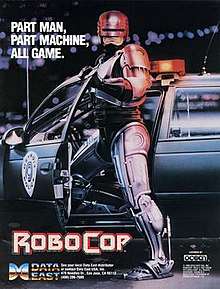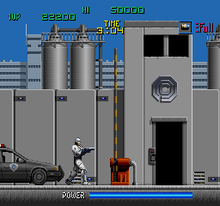RoboCop (1988 video game)
RoboCop is a beat 'em up/run and gun arcade game developed and published by Data East in 1988 based on the 1987 film of the same name.[6][7] It was sub-licensed to Data East by Ocean Software, who obtained the rights from Orion Pictures at the script stage.[1][8]
| RoboCop | |
|---|---|
 North American arcade flyer | |
| Developer(s) |
|
| Publisher(s) | Data East
|
| Designer(s) | Yoshiyuki Urushibara |
| Programmer(s) | Ryōji Minagawa |
| Artist(s) | Tomoo Adachi |
| Composer(s) | Hiroaki Yoshida Hitomi Komatsu |
| Series | RoboCop |
| Platform(s) | |
| Release | 1988
|
| Genre(s) | Beat 'em up, run and gun |
| Mode(s) | Single-player, multiplayer (not in all versions) |
| Cabinet | Upright |
| Arcade system | Data East MEC-M1[5] |
| CPU | 16-bit: M68000 (@ 10 MHz), 8-bit: HuC6280 (@ 1.3 MHz)[5] |
| Sound | Sound CPU: M6502 (@ 1.5 MHz), Sound chips:[5] YM2203, YM3812, OKI6295 |
| Display | Raster, 256 x 240 pixels (Horizontal) |
Gameplay

Robocop is a hybrid game, featuring elements from both beat 'em up as well as run and gun titles.
Release
Despite being an arcade game, numerous versions appeared for home computers and video game consoles. The first group was released in 1988 for the Apple II, PC compatibles, Amiga, and Atari ST. The Apple and PC ports were developed by Quicksilver Software, while the Amiga and ST versions were developed directly by Ocean. Data East published the game in North America. A NES port followed in 1989, developed by Sakata SAS Co, and a version for the TRS-80 CoCo 3. Ocean developed and published a version for the Game Boy in 1990.
In 1989, Ocean released a different Robocop game that only bore a loose resemblance to the arcade; this version was produced for the Commodore 64, MSX, ZX Spectrum, Tandy Color Computer 3 and Amstrad CPC, as well as PC compatibles, meaning that PCs ended up with two entirely different Robocop games for North American and European audiences. As with many Ocean C64 titles, both cassette and disk versions were released; the North American release (also published by Data East) was based on the disk version. All C64 RoboCop versions were notorious for having high numbers of bugs; in 2015, cracker group Nostalgia released a completely bug-fixed Robocop compatible with both PAL and NTSC machines.[9] A port of the game for the Atari Jaguar was planned but never released.[10][11]
Reception
| Reception | ||||||||||||||||
|---|---|---|---|---|---|---|---|---|---|---|---|---|---|---|---|---|
| ||||||||||||||||
| ||||||||||||||||
The ZX Spectrum version of RoboCop achieved particular critical success, receiving a CRASH Smash award from CRASH,[18] 94% in Sinclair User[14] and Your Sinclair gave 8.8 out of 10,[19] also placing it at number 94 in the Your Sinclair official top 100. The overall opinion was that this game was better than the original arcade game. Its capture of the original material, smooth scrolling and animation, sampled speech and sound effects were highlighted.
In addition, the ZX Spectrum RoboCop was one of the biggest selling games of all time on that platform and was number one in the sales charts for over a year and a half.[20] It entered the charts in April 1989, and was still in the top five in February 1991.[21] The readers of YS voted it the 9th best game of all time.[22]
The title theme of the Ocean Software versions (composed by Jonathan Dunn) has become well known for its serene, calm tune, which heavily contrasted the tone of both the actual game and the source material; the version of the theme heard in the Game Boy port was later licensed by European kitchen appliance company Ariston for use in a series of TV adverts.[23] The song was also used as the theme song for Charlie Brooker's documentary, How Videogames Changed the World,[24] as well as the music for the Internet short, "Dilbert 3".[23] The song was sampled in Lil B's song, "In Down Bad", from his mixtape "White Flame".[23][25]
References
- Mason, Graeme (January 19, 2014). "The making of Robocop - Thank you for your co-operation". Eurogamer. Archived from the original on 2018-09-06. Retrieved 2018-09-09.
- The Retro Brothers (October 4, 2009). "ZX Spectrum Games - Robocop". zxspectrumgames.blogspot.com. Archived from the original on 2018-09-09. Retrieved 2018-09-09.
- "FAMICOM Soft > 1989". GAME Data Room. Archived from the original on 2016-10-20. Retrieved 2018-09-09.
- "GAMEBOY Soft > 1991". GAME Data Room. Archived from the original on 2018-09-09. Retrieved 2018-09-09.
- "Data East MEC-M1 Hardware (Data East)". system16.com. 2015-02-12. Archived from the original on 2017-09-21. Retrieved 2018-09-08.
- "RoboCop - The Future of Law Enforcement". arcade-history.com. Archived from the original on 2018-09-12. Retrieved 2018-09-12.
- Kenjō, Kōji (October 1988). "Video Games - ビデオゲーム新作インフォメーション". Micom BASIC Magazine (in Japanese). No. 76. The Dempa Shimbunsha Corporation. pp. 268–269.
- Mellor, Robert (January 2008). "The Making Of: RoboCop". Retro Gamer. No. 46. Future Publishing. pp. 62–65. Archived from the original on 2017-02-02. Retrieved 2018-09-05.
- "Archived copy". Archived from the original on 2018-12-18. Retrieved 2019-01-05.CS1 maint: archived copy as title (link)
- "Atari Jaguar Sector II Forum Link". jaysmith2000.com. Archived from the original on December 2, 2006. Retrieved September 5, 2018.
- "Atari Jaguar Lost Games". janatari.de. Archived from the original on 2018-09-06. Retrieved 2018-09-05.
- "Archive - Magazine viewer". World of Spectrum. Retrieved August 20, 2012.
- "Archive - Magazine viewer". World of Spectrum. Retrieved August 20, 2012.
- "Archive - Magazine viewer". World of Spectrum. Retrieved August 20, 2012.
- "Robocop". Ysrnry.co.uk. Archived from the original on April 19, 2012. Retrieved August 20, 2012.
- "Archive - Magazine viewer". World of Spectrum. Retrieved August 20, 2012.
- "Archive - Magazine viewer". World of Spectrum. Retrieved August 20, 2012.
- RoboCop Archived 2018-08-28 at the Wayback Machine review from CRASH issue 59, December 1988; retrieved from CRASH Online
- RoboCop Archived March 1, 2007, at the Wayback Machine review from Your Sinclair issue 39, March 1989; retrieved from The Your Sinclair Rock 'n' Roll Years
- "The YS Complete Guide To Shoot-'em-ups Part II" Archived July 1, 2007, at the Wayback Machine from Your Sinclair issue 56, August 1990; retrieved from The Your Sinclair Rock 'n' Roll Years
- "The YS Rock'n'Roll Years - Issue 62". Ysrnry.co.uk. Archived from the original on September 7, 2012. Retrieved August 20, 2012.
- Your Sinclair magazine issue 93, Future Publishing, September 1993, page 58
- Person, Chris (February 16, 2012). "What do Robocop, Washing Machines, Dilbert & Lil B have in Common?". Kotaku. Archived from the original on 2016-10-26. Retrieved October 25, 2016.
- Whitehead, Dan (December 5, 2013). "TV review: How Videogames Changed the World". Eurogamer. Archived from the original on 2016-10-25. Retrieved October 25, 2016.
- Rougeau, Michael (February 16, 2016). "Gameboy "Robocop"'s Theme Song Also Sold Washers, Made Dilbert Homicidal And Got Sampled By Lil B". Complex. Archived from the original on 2016-10-26. Retrieved October 25, 2016.